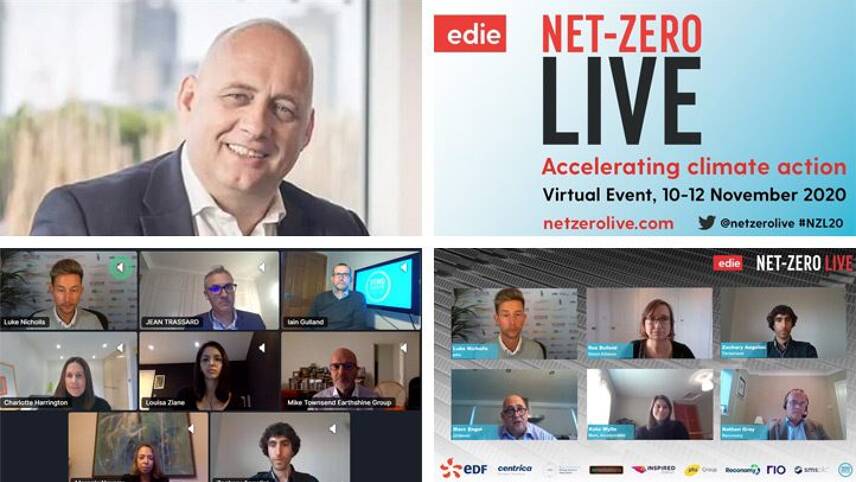Register for free and continue reading
Join our growing army of changemakers and get unlimited access to our premium content

Unilever's Marc Engel (top left) provided the opening keynote speech from his home
For the first time ever, edie’s flagship Net-Zero Live event is being held virtually. The second day of the three-day conference, hosted in association with EDF Energy, was (digitally) jam-packed as hundreds of attendees took part in open roundtables, polls and speed networking. The day’s overarching theme was resources, with lively debates on all things related to resource efficiency, the circular economy and engagement.
Unilever’s chief supply chain officer Marc Engel kick-started the day’s proceedings with a keynote speech, in which he outlined the consumer goods giant’s sweeping approach to circularity and provided his thoughts on the green recovery movement.
“The world is facing multiple crises, from the pandemic that grips society at the moment, to the warming of our planet and the loss of nature, to the growing inequalities that our systems manifest,” Engel said. “There are multiple and existential crises.
“It’s becoming increasingly clear that these issues are all interconnected…The way to deal with one of them is to deal with all of them.”
Engel urged businesses to work with policymakers to deliver an “intentional” transition to a position of stewardship. He also emphasised the importance of redefining sustainable business leadership, adding: “We know that we need to go further; we were always in the space of doing no harm, rather than doing good. With the science that we now have on our environmental crises, it is time for something new.”
High-level discussions on the nature of sustainable business post-pandemic continued into the next session – a panel discussion featuring representatives from Mars, Timberland, Green Alliance and Reconomy.
Timberland’s environmental manager Zachary Angelini said that “the way of the future for good businesses” lies in circularity and in regenerating nature. He also argued that the future of leadership is collaborative, saying: “If we are all marching in this direction together, we are going to reduce collective frictions and really amplify our impact.”
Panellists also provided an update on R&D, refill and reuse in the context of lockdown. They agreed that while some consumer-facing initiatives have been paused in recent months, a new wave of action is brewing. Moreover, several speakers said that R&D has become more innovative in the remote working economy.
Masterclass and roundtables
Following a brief break, expert representatives from WWF and phs delivered a 45-minute masterclass on eliminating single-use plastics.
Topics ranged from overcoming jargon and consumer confusion; to collaborating to scale up innovations; to avoiding unintended negative consequences as alternative materials or packaging-free products are introduced.
WWF’s sustainable materials specialist Paula Chin also provided an update on the global policy situation and urged businesses to get ahead of the curve. The NGO is playing a key role in developing a Global Treaty on Plastic Pollution.
The last two sessions of the day were open roundtables on engaging staff and consumers to drive behaviour change, and on innovating business models themselves.
In the former of these sessions, speakers from organisations including Coca-Cola European Partners and the London Waste and Recycling Board spoke about the importance of linking the circular economy to the net-zero movement.
Panellists agreed that Covid-19 has not been a pause, but a good time to rethink products and services, as consumer priorities are shifting rapidly. Internal engagement, when done correctly, will help to energise and connect departments rather than feeling like a burden, they added.
In the latter, speakers discussed the importance of embedding purpose and challenging assumptions as necessary foundations for forays into reuse, refill, resale, repair and innovative product design. Toast Ale’s COO Louisa Ziane highlighted the importance of clarity, and of avoiding hypocrisy by assessing culture from recruitment to partnerships. Zero Waste Scotland’s CEO Iain Gulland argued that businesses should acknowledge that innovation and purpose-led business are ongoing processes.
Please note: Recordings of the Day Three sessions will be made available to registered attendees shortly.
edie Staff


Please login or Register to leave a comment.